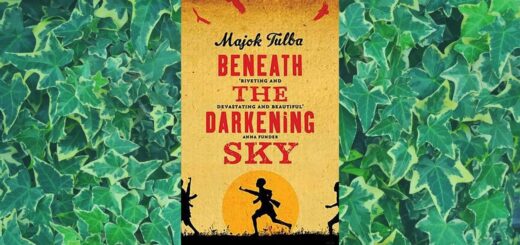Reading Zambia: The Mourning Bird
Reading Zambia with The Mourning Bird raises a number of important questions related to reading African literature. While the country is relatively well-known in South Africa for its role in supporting the anti-Apartheid struggle, that is a grateful foreigner’s perspective; the protagonist of The Mourning Bird has no such story to tell. This Zambian novel has been met with much praise so it was exciting to get stuck into it.
The Mourning Bird

The Mourning Bird is first and foremost Chimuka’s story. Through her eyes, we have intimate access to a family always teetering at the edge: late salaries, alcoholism, infidelity, sexist favouritism…Chimuka feels close to her father but we know from the start that he is less than she thinks. When he dies, it’s questionable whether she mourns him or rather the socio-economic status his job as a teacher afforded her. She sees his face everywhere and remembers him fondly; as she navigates life on the streets, she recalls what life was like when he was alive.
However, this imagined closeness does little for the reader’s intimacy with Chimuka. She is a withdrawn protagonist. She tells the story, and we see the worst and best of her life, but she is overshadowed by the tumultuous turns life takes. Her triumph, which the blurb promises, is poorly constructed: rushed into the last chapter of a story that gave no indication it would even arrive. In a way, this represents the reality of many Africans who do not succeed in taking agency over the challenges that life in a former colony presents. This Zambian novel is not so much a triumph as the barest bones of a tragedy: no glamour, no heroism, but just the painful truth of what could have been, had the circumstances been different.
If we cannot get close to the protagonist, what then? The Mourning Bird purports to be a national portrait of Zambia, including, strikingly, its shame. I’m not sure it lived up to this. Zambia’s shame is all over the pages but is a country defined by its shame? Reading Africa is difficult because I want to read both a reflection of a reality and a resistance to the stereotype, an achievement few authors manage elegantly. Certainly, conflict, social breakdown and poverty are realities of life on the continent but they’re also the context for incredible humanity and mundanity. Chimuka, however, is drowned by her circumstances and the triumph we are promised never quite arrives.
But there is a national portrait in the book — an incomplete version that is nevertheless true for many African countries, including South Africa — in that The Mourning Bird is about the breakdown of a family and the far-reaching consequences this has. The book bursts with familial relations — Tata, Mama, Ali, Kufe, Bo Sitali, Bo Humprey, Aunt Grace and the many other aunts and uncles on both sides of the family who traipse in at family milestones — and also mentions an extended network of friends, notably Bana Mulenga. How, then, do two children end up sleeping under a bridge, relying on theft and prostitution for sustenance?
The first part of the book tells us of a progressive breakdown of the family as a support structure and the descent into socio-economic isolation and poverty that follows. The family is traditionally the basic unit of African societies (this is true, too, in most cultures around the world) and performs not just a social role but an economic one. I know this only too well. Like many other children, my babysitters were my grandparents. They fetched me from school, fed me, entertained me, disciplined me — everything — not just while my parents worked but so my parents could work. My parents never paid a professional babysitter in their lives because there was always someone in the family who would take care of me. At first, this seems to be the case with Chimuka: Mama replaces Tata, Bo Sitali replaces Mama. But Chimuka ends up completely cut off from her family (perhaps because the family is so buried in their own individual difficulties to truly care for her). Like Chimuka, many homeless children in South Africa have in fact run away from home because the family is unable to care emotionally, sometimes to the extent of being abusive. This Zambian novel, then, reminds me of the abundance offered by the family as a social structure and how terrible things are when it falls apart.
I don’t know what I expected , but I was disappointed when the talk about the chidlren didn’t attract as much vigour in their voices as one about his clothes and his shoes. I don’t know when it happened, but slowly the sombre affair — the division of Tate’s personal belongings, turned into a party, and the men’s voices grew loud and competitive as the empty crates of Mosi lager strewn on the front lawn increased in number and more strange faces appeared.
Chimuka, The Mourning Bird
Because when the family fails Chimuka, the state doesn’t step in. And it’s here that The Mourning Bird really reflects a socio-economic reality of extreme poverty, as well as a nuanced take on the government’s response. Again and again, the major socio-economic events in Chimuka’s life are preempted by the state’s response to the phenomena in general. “SHE IS HIV POSITIVE”, Chimuka reads at the clinic; at home another day, she hears “tuberculosis” whispered by her mother and the next day Tate is dead. “Property grabbing is a crime”, the TV soapie warns Chimuka; she goes home and her father’s relatives are packing up his belongings.
The state knows of these problems, it wants to make its people aware and it has responses but none of them helps Chimuka. In the later part of the book, we’re told of the volunteers feeding street children on Independence Day and Christmas, taking photos before retreating for another year. There is an orphanage but the children prefer the streets. The disconnect between the state and its most vulnerable citizens is striking. And it’s something we see in South Africa, too: our constitution is a sophisticated touchstone in democracy and our government goes through all the motions of implementing it, yet still, we have hungry children on the streets.
What The Mourning Bird Taught Me About Zambia
No Reading Africa book review would be complete without thinking about what I learned about the country. Here, the book disappointed me. As someone in my book club said, if you took out the names, it could have been set in any African country. Specificity is so important in Reading Africa because this is a project about undermining stereotypes about the continent. What makes Zambia special? What makes its people special? I didn’t get any sense of this. Even with all our problems, as South Africans, we tend to have some sense of what South Africa is about (even if it’s our rather vague, problematic “diversity” or complacency of having “won the Struggle”). Zambia in The Mourning Bird is almost ahistorical. There is mention of a coup and a few critics of Kaunda supporters but politics does not drive the action of this Zambian novel and, while history probably did define Lusaka, it does not show.
Reading Zambia through The Mourning Bird, then, served less to portray a nation than it did to warn us as individuals, families and states. Zambia in all its historical and cultural nuance is not the subject of this book. The story takes place on such a micro-scale that it is almost divorced from context. The Mourning Bird falls flat as a story of triumph or agency but it does reveal the blistering vulnerability of children and the important role individuals, families and states can play in nurturing them.
If we do the work, though, there are a number of clues we can follow to an understanding of Zambia in its specificity and its ‘Africanness’. The connection to the rural areas — albeit distant and fractured — is there. Relatives, including Bo Sitali, traipse to the city to stay with their graduate brother, bringing with them an indigenous language and a belief system other than Mama’s Christianity. The title itself draws on the belief of an owl as a portent of death, a story Chimuka’s father tells her. English may be the language that opens doors but for blending in on the streets, it’s ciNyanja, siLozi and ciTonga.
Listen here, Tonga girl.
Auntie Grace (who is Lozi) to Mama, The Mourning Bird
These details pointed me towards the structure of national portrait. In fact, Zambia boasts 72 languages (many are dialects rather than distinct languages but it’s still a lot!). However, like many African countries, the former colonial language, English, holds sway. In fact, English is the only official language — a policy thought to prevent conflict between indigenous linguistic groups. Zambia is smack-bang in the centre of Africa, sharing borders with eight countries. The Lusaka shown in this Zambian novel, despite its poverty, has the atmosphere of a rural town; there is, of course, a modern city.
The Lozi people, of whom Tate is part, have their heartland in the Western Province, or Barotseland, which shares a border with Namibia and Angola. The kingdom of Barotseland, a former British protectorate, has actually sought to become independent of Barotseland. The language, siLozi, shares many similarities to Setswana and Sesotho, something which was recently highlighted in the media, causing some to point out the close ties between African countries — showing, again, why Reading Zambia is important.
About Zambian Writer Mubanga Kalimamukwento
Mubanga Kalimamukwento is one of the newest Zambian authors. She studied and practised as a lawyer until 2019, and has a particular interest in women’s rights. She grew up in Zambia but lives in the United States.
I’m excited to share my book The Mourning Bird with book lovers. It’s about my caricature of what might have happened had I not been born into a family that placed a high value on formal education and the financial independence of women.
Kalimamukwento, in an interview for Bona Magazine
Is The Mourning Bird the Zambian Novel for You?
The Mourning Bird remains one of the most popular amongst books by Zambian authors. It’s not hard to see why; this Zambian novel is unflinching in its depiction of poverty and the gendered challenges poverty presents, and there is something of a happy ending. In terms of confronting stereotypes about Africa and learning more about Zambia, though, readers of The Mourning Bird have to do a lot of the work themselves.


